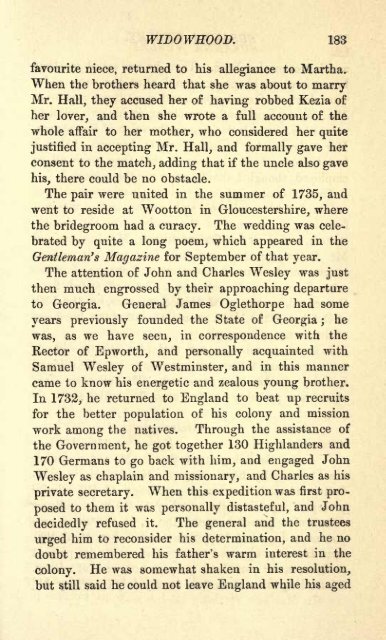Susanna Wesley
This is the story of Susanna Wesley, 1669-1742 Mother of Charles and John Wesley, who were founders of the Methodist Church. Susanna and her husband, Samuel, had nineteen children, ten of whom survived to adulthood. Her son Charles became a well-known hymn writer and her son John became the found of Methodism. Susanna was brought up in a Puritan home as the youngest of twenty-five children. As a teenager, she became a member of the Church of England. She became the wife of a chronically debt-ridden parish rector in an English village. She said, "I have had a large experience of what the world calls adverse fortune." Nonetheless, Susanna managed to pass down to her children Christian principles that stayed with them.
This is the story of Susanna Wesley, 1669-1742 Mother of Charles and John Wesley, who were founders of the Methodist Church. Susanna and her husband, Samuel, had nineteen children, ten of whom survived to adulthood. Her son Charles became a well-known hymn writer and her son John became the found of Methodism.
Susanna was brought up in a Puritan home as the youngest of twenty-five children. As a teenager, she became a member of the Church of England. She became the wife of a chronically debt-ridden parish rector in an English village. She said, "I have had a large experience of what the world calls adverse fortune." Nonetheless, Susanna managed to pass down to her children Christian principles that stayed with them.
Create successful ePaper yourself
Turn your PDF publications into a flip-book with our unique Google optimized e-Paper software.
WIDOWHOOD. 183<br />
favourite niece, returned to his allegiance to Martha.<br />
When the brothers heard that she was about to marry<br />
Mr. Hall, they accused her of having robbed Kezia of<br />
her lover, and then she wrote a full account of the<br />
whole affair to her mother, who considered her quite<br />
justified in accepting Mr. Hall, and formally gave her<br />
consent to the match, adding that if the uncle also gave<br />
his, there could be no obstacle.<br />
The pair were united in the summer of 1735, and<br />
went to reside at Wootton in Gloucestershire, where<br />
the bridegroom had a curacy. The wedding was celebrated<br />
by quite a long poem, which appeared in the<br />
Gentleman's Magazine for September of that year.<br />
The attention of John and Charles <strong>Wesley</strong> was just<br />
then much engrossed by their approaching departure<br />
to Georgia. General James Oglethorpe had some<br />
years previously founded the State of Georgia he<br />
;<br />
was, as we have seen, in correspondence with the<br />
Rector of Epworth, and personally acquainted with<br />
Samuel <strong>Wesley</strong> of Westminster, and in this manner<br />
came to know his energetic and zealous young brother.<br />
In 1732, he returned to England to beat up recruits<br />
for the better population of his colony and mission<br />
work among the natives. Through the assistance of<br />
the Government, he got together 130 Highlanders and<br />
170 Germans to go back with him, and engaged John<br />
<strong>Wesley</strong> as chaplain and missionary, and Charles as his<br />
When this expedition was first pro-<br />
private secretary.<br />
posed to them it was personally distasteful, and John<br />
decidedly refused it. The general and the trustees<br />
urged him to reconsider his determination, and he no<br />
doubt remembered his father's warm interest in the<br />
colony. He was somewhat shaken in his resolution,<br />
but still said he could not leave England while his aged


















